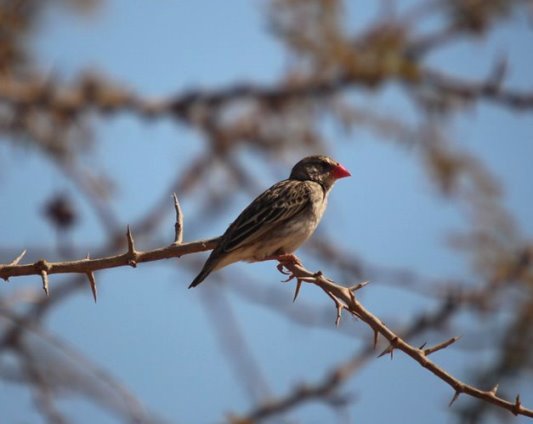Redbilled quelea, the feathered locust

Author: Ivan Lätti
Photographer: Eric Aspeling
When not decked in breeding season feathers, the male redbilled quelea has only its short, orange-red bill to lift it above the ranks of LBJ, i.e. little brown job, not a former American president. Scientifically they are known as Quelea quelea.
Smaller than sparrows and somewhat similar in appearance, they make up for small size by large numbers. Vast swarms in the thousands, even millions of these birds, “the most numerous, undomesticated bird on earth”, fly together like a fast-moving cloud.
They drink on the wing when “rolling” and dipping in masses over and into water. What is more (or worse), these swarms predominantly eat seeds of annual grasses and cereal grains, doing so prodigiously from veld and farmed fields.
Breeding migrants in the northern half of South Africa, not permanent residents here, they depart for tropical Africa before winter. Red-billed queleas avoid cold, high-altitude parts, as well as forests and deserts.
This does not help farmers much as they are a seasonal crop plague, sometimes referred to as Africa’s feathered locusts.
The small, roofed, quelea grass nest with side entrance hangs from a thorn tree or among reeds. The birds breed in very large colonies, up to 500 nests to a tree, or nests spreading over several hectares.
Around three greenish blue or bluish white eggs are hatched in twelve days or less by both parents. In hot weather they do so only at night, the eggs hot enough during the day by themselves. Nestling the chicks lasts about two weeks, after which the young augment the flock on the wing. This is unless something goes wrong, chick mortality being high.
These birds serve as food to raptors, vultures, some small mammals and monitor lizards. The species is of least concern on the IUCN Red List in spite of redbilled queleas being poison sprayed for reducing their impact on crops (Maclean, 1993; Wikipedia).

